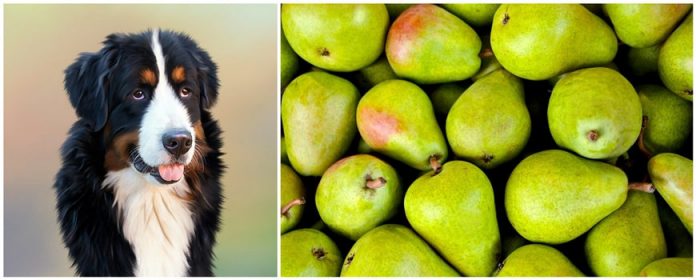Does your dog love apples? You might be wondering if you can also offer him pears, which is closely related to apples. Like apples, pearsare also considered as one of the healthiest fruits for us, humans. We all know giving apples to dogs may come with risks because of their cores. Given that, can you safely share pears with your furry little friend? Read on to find out!
Can Dogs Have Pears?
Pears are safe for dogs, as long as you only offer them the flesh. Flavor-wise, pears are juicy and mildly sweet so your dog might enjoy eating them. There are varieties of pears that also have a crunch to them, along with the gritty taste. However, if your dog is used to eating apples, he might not find pears so inviting due to their grainy texture.
If your buddy right there seems to enjoy pears, feel free to offer them once in a while. A slice of pear will be enough for your pet because too much of this fruit can be bad for his stomach. Pearsare loaded with fiber that can upset the dog’s stomach if he eats way too much.
Wash the pears properly to get rid of any bacteria or dirt on the outer surface. Chop them in small pieces to make them easier to chew. Your dog can eat the skin but always get rid of the core, especially the part containing the seeds.
In general, a canine’s diet should consist mostly of protein.Fruits and veggies should only account for 10% of their daily intake so consider fruits as a treat or a snack your dog can munch on from time to time.
Risks of Feeding Pears to Dogs
Be careful not to let Fido devour on a whole pear. Some dogs can eat it whole and this is not good for them as it can lead to intestinal obstruction, which can put your pet’s life at risk.
Another concern with pears is their seeds, which contain cyanide. If your pet happens to eat too many pears and cracked the seeds open, it could cause him to suffer from cyanide poisoning.
Therefore, simply follow this rule in feeding your pet. Introduce anything in small amounts and if your pet happens to like it, let him devour it in moderation. In case he had the runs even if you only offered a small quantity, don’t give him any more pears.
Remember that there are so many fruits you can share with your dog. Don’t feel so sorry for your dog if he does not like pears. There are always bananas, blackberries, and strawberries that are as nutritious as pears.
What to Do If Fido Ate the Pear Seeds
There are a few symptoms you have to keep an eye on, depending on the amount of pear your dog ate. If he happened to eat four or five pears in one sitting, he would likely suffer from diarrhea due to the fruit’s fiber content. We suggest bringing the sick dog to a vet if the diarrhea is accompanied by lethargy and vomiting.
Intestinal blockage is not really an issue since pears only have very tiny seeds. Your concern here is the stomach upset, which should be treated immediately. Your vet may also suggest putting the dog on a bland diet for a couple of days.
A bland diet consisting of brown rice and hamburger or chicken can help in relaxing the dog’s stomach. It should be given once the pet is ready to eat. For the first 12-24 hours of diarrhea, it is recommended for the dog to fast.
Potential Benefits of Pears to Dogs
- They can protect your dog’s cells from free radical damage. This is due to their high copper and Vitamin C content. Although dogs are capable of producing their own Vitamin C, an added dose of this vitamin will not hurt. This means pears can help in boosting your pet’s immune system.
- They can be given to dogs prone to allergies. For humans, pears are among the fruits often given to babies, who happen to have sensitive stomachs. This is because pears possess a hypoallergenic property. But of course, we still suggest seeking your vet’s opinion if you have a pet that has a really sensitive tummy.
- They are good for the heart. Because of their fiber content, they help in lowering cholesterol levels which in turn supports heart health. They can promote cardiovascular health, especially among middle-aged and senior dogs.
- Pears can prevent constipation. This is because pears are a great source of soluble fiber which can help in making your pet feel fuller. In fact, a single pear contains 22% of fiber. The rest are other nutrients such as copper, magnesium, and Vitamins C and K. Due to their moderately high fiber content, pears are an ideal treat for dogs with diabetes.
- They can decrease blood sugar levels. Prickly pears, in particular, are said to be effective in reducing sugar levels in the blood which makes them a wholesome option for diabetic patients. When your pet has a sweet tooth, he will surely enjoy the taste of the ruby red prickly pear.
- They can prevent throat problems. Not only that, but pears can also nourish the throat. This is why pears are often regarded as one of the best summer fruits. They are packed with hydrating properties that can help especially during those scorching hot days. You can make juice out of pears if you like, but don’t share it with your dog. The fruit itself will be enough for him.
- It has anti-inflammatory properties. They are a suitable treat for dogs with arthritis because they can help in relieving inflammation. They can be helpful in lessening muscle strains. In case your dog is suffering from painful joints due to arthritis, you can offer him anti-inflammatory foods such as pears from time to time.
Dog-Friendly Pears Recipes
Just as you can use apples in a variety of doggie treats, you can also use pears to make a few delectable dishes for your buddy. Take a look below at our featured recipes containing pears!
Chicken Jerky with Pear and Basil
Does your dog enjoy a serving of chicken jerky? Make the traditional recipe more nutritious and more filling with our recipe below. It may take more than a couple of hours to make but this one is definitely worth giving a try:
- In a food processor, puree a piece of cored and chopped pear.
- Add in a teaspoon of ginger, a pinch of cinnamon, and 2 cups of water.
- Pulse until everything is well-combined. Set the pear mixtureaside.
- Slice 2-3 pieces of chicken breast into thin strips. Freezing it for an hour beforehand will make it easier to slice. Get rid of the fat from the meat.
- Transfer the sliced chicken breasts in your pear mixture.
- Marinate the meat for 1-2 hours in the fridge.
- Once it is ready, place the pieces of meat on a cookie sheet. Make sure they are placed at least half an inch apart from each other.
- Chop two basil leaves and put them on top of the meat before baking.
- Dry in the oven for roughly 3 hours at 180°
- Allow cooling before serving to your dog.
Pear and Molasses Dog Biscuits
Molasses is a healthier alternative to table sugar. Yes, your dog can have it in moderation. He will surely enjoy the sweetness of molasses, combined with the delicious pear. Follow this recipe when you feel like making a healthy biscuit for your furry friend:
- Chop 2 cups of cored pears. Toss them in a medium-sized mixing bowl.
- Add in 2 and a half cups of whole wheat flour, 1/4 cup of water, a tablespoon of baking powder and 3 tablespoons of molasses.
- Stir nicely until you get a thick consistency.
- Transfer on a lightly floured surface and start kneading.
- Roll out the dough to roughly a quarter of an inch thick.
- Cut using any cookie cutter of your choice.
- Place on a cookie sheet slightly separated from each other.
- Bake in a preheated oven at 350°F for 30 minutes or until golden brown. Serve the biscuits to your pet once they are completely cool.
Pear Dog Treat with Sunflower Seeds
Like pears, sunflower seeds offer a myriad of health benefits to doggies. They are good for the skin and coat, due to their healthy fat content. Incorporate sunflower seeds in your pet’s baked treats by following these steps:
- Puree a piece of cored pear in a food processor. Transfer in a mixing bowl.
- Add in 1/4 cup of Parmesan cheese, 1/4 cup of sunflower seeds, half a cup of spelt flour, and just a pinch of cinnamon.
- Stir using a wooden spatula until all the ingredients form a slightly thick dough.
- Roll out the dough into half an inch balls.
- Transfer on a baking sheet lined with parchment paper, at least half an inch away from each other.
- Flatten it a bit with a slight press using a fork.
- Bake in a preheated oven at 350°F for roughly 15 minutes.
How to Choose Pears for Your Dog
There are roughly 300 varieties of pears. There is the Bartlett, the Bosc, and the Anjou pear among others. Although most of them are lusciously sweet, some still taste different. Asian pear, for instance, has a milder flavor compared to other kinds of pears. If your pet does not like the grainy texture, choose the Comice variety since it is not as grainy as the others.
The problem with pears is that they usually don’t ripen well when they are on trees. This is why they are normally harvested when they are not yet fully mature. However, it is actually not a pleasant experience to taste an unripe pear. It will not taste as sweet as the ripe ones so your dog might not even bother to take a second bite.
When choosing pears for your dog, use your sense of touch because you cannot tell the ripeness of a pear just by looking at it. Touch it near the end of the stem with gentle pressure. If it squishes at the middle portion then it’s highly likely that the pear is already overripe. It should only give slightly as an indication that it is ripe enough.
If the pear is not yet ready for consumption, consider storing them at room temperature. Most of the varieties, if not all, will ripen on their own in just a matter of days. You can also store them in a paper bag along with another ripe fruit.
The Bottom Line
Giving pears to your pooch is a great option when you are looking for a doggie snack that is natural and nutrient-dense. Aside from the fact that they are good for the heart, they also support a healthy gut because of their rich fiber content. This can be a wholesome addition to a diabetic dog’s diet or a canine suffering from arthritis.
Just make sure to offer the fruit in small amounts to avoid gastrointestinal issues. Never let your pet get into the core because the seeds can be toxic if your pooch happens to munch it well and crack it open.
To wrap things up, we still recommend that you consult your vet in case you are planning to include pears in your pet’s regular diet. Some dogs tend to have a sensitive stomach and may suffer from diarrhea even with a small quantity of pears.





















